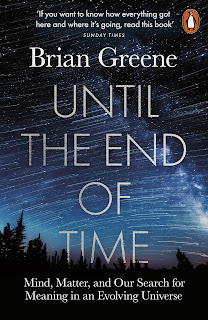Updated for paperback
Things start well with this latest title from Brian Greene: after a bit of introductory woffle we get into an interesting introduction to entropy. As always with Greene's writing, this is readable, chatty and full of little side facts and stories. Unfortunately, for me, the book then suffers something of an increase in entropy itself as on the whole it then veers more into philosophy and the soft sciences than Greene's usual physics and cosmology.
So, we get chapters on consciousness, language, belief and religion, instinct and creativity, duration and impermanence, the ends of time and, most cringe-making as a title, 'the nobility of being'. Unlike the dazzling scientific presentation I expect, this mostly comes across as fairly shallow amateur philosophising. This is a distinct case of attempting to discover the answer to 'life, the universe and everything', but missing the compactness of the answer 42.
Of course it's perfectly possible to write good science books on, say, consciousness or language - but though Greene touches on the science, there far too much that's more hand-waving. And good though he is at explaining physics, I'm not sure Greene is the right person for the job of dealing with these softer subjects.
Overall, despite the problems I had with it, it's a slick, well-written book, but it's not what I want from a popular science title - too subjective, too flowery and lacking the sense of wonder and fascination I want from good science writing. It may well appeal if touchy-feely is your thing, and Greene continues to add in little scientific asides as he goes, but I'm afraid I lost interest in a big way.
It often seems that science writers have to get one 'inner feelings' kind of book off their chest: hopefully Greene can now return to what he does best. Some readers will like the idea of a hard science writer going soft, but I wasn't impressed with the outcome.


| Paperback: |
| Bookshop.org |




You nailed it. Thanks for finding the words on a book where the author never found the words to express what he never defined beforehand. As Boileau says: CE QUI SE CONÇOIT BIEN S'ÉNONCE CLAIREMENT ET LES MOTS POUR LE DIRE VIENNENT AISÉMENT.
ReplyDelete